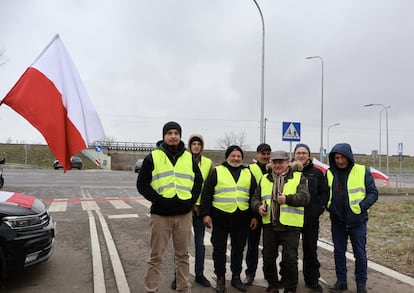Poland is encouraging truckers and farmers to block thousands of Ukrainian trucks at the border
With the connivance of the Polish authorities, transporters and agriculturalists have left Ukrainian drivers stuck for days, claiming they represent unfair competition
The picket of Polish farmers shelters from the cold in a tent with a stove and a tray with freshly roasted sausages. There are also cookies, hot drinks, and music. The atmosphere was lively last Sunday. It has been four days since they spent hours in the snow in their effort to block the Medyka border between Poland and Ukraine. They are protesting the free movement of Ukrainian transport in the European Union, and their blockade has now been taken over by the Polish police. The protesters only allow two trucks to pass every two hours. “The crossings are now being regulated by the police to avoid conflicts with Ukrainian drivers, and because standing in the middle of the road is uncomfortable in these low temperatures,” said Mikolai Toborowicz, one of the dozen farmers who was in the tent on Sunday.
Hundreds of commercial vehicles are waiting an average of six days to cross the border at Medyka, according to accounts collected by EL PAÍS. The conditions for the drivers are unsanitary. There are no bathrooms, no places to wash, and no hot food. There is only what is supplied by envoys from the Ukrainian Government or by NGOs such as World Central Kitchen, run by Spanish chef José Andrés. Garbage and feces have accumulated on the hard shoulder. There are also no medical services, and two Ukrainian truck drivers, who suffered from health problems, have already died in their cabs without anyone noticing the emergency.
Poland is one of the European countries that has most firmly defended the need to support Ukraine after the Russian invasion. But since November 6, organizations of transporters and farmers from the eastern part of the country have coordinated to blockade four border crossings. They maintain that they are not stopping humanitarian aid shipments, perishable products, tanker trucks with fuel, nor the transfer of military material. But they do not always keep their word. A Polish driver from World Central Kitchen, who prefers to remain anonymous, says that if they consist of several vehicles, humanitarian aid convoys also have to endure long waits, “they are only given fast track if there are one or two.” Yevhen Rubanko drives a diesel tanker truck. Since the border blockade began, he has had to wait three days to enter Ukraine. Before the protests, he only needed four or five hours.
The pickets have been granted permission from the Polish government to maintain the blockade until next January and have already requested to extend it until February. They have a range of demands, but they agree on one issue: they consider that the free movement of the Ukrainian transportation sector and agricultural products is unfair competition because they now have the same rights as EU companies but without having to comply with the bloc’s regulatory requirements.

Protesters have rejected the European Commission’s order to temporarily allow Ukrainian transporters to operate under the same conditions as companies from EU member states. This is a goodwill gesture to aid a country that has been invaded in the biggest war in Europe since 1945; moreover, due to the threat of Russian warships, Ukraine is only minimally able to use its main export outlet through the Black Sea. This route accounted for 80% of its exports before the Russian invasion, according to a spokeswoman for the Ukrainian Ministry of Infrastructure Development.
Temperatures below zero degrees Celsius
This ministry estimates that the losses for its economy, in the more than 20 days of the blockade, already exceed €400 million ($439 million). In a statement on November 26, the Ukrainian authorities put the number of trucks stuck on the three blocked roads at 2,000. Attempts at bilateral negotiations between governments, including direct dialogue between the Ukrainian Executive and the protesters, have been unsuccessful. “The time to reach a compromise is over,” Deputy Infrastructure Minister Serhiy Derkach said on November 24: “Our drivers are suffering in sub-zero temperatures due to the actions of a few people with the consent of local authorities. We have demanded on several occasions that the Poles provide the drivers with food, emergency and fire services, and proper sanitary conditions. There is none of this.” For his ministry, the only solution now is for the EU to assign a monitoring team to the border.
Derkach also confirmed that the Polish government is failing to comply with the agreement signed by the EU to guarantee the free movement of Ukrainian transporters. The president, Volodymyr Zelenskiy, is committed to being conciliatory with a military ally and a country that has received two million Ukrainians who have been displaced by the war. “We have to be restrained in our response. We must give our neighbors time. The situation will improve,” said the president, pointing out that the solution will be political. Zelenskiy is confident that a possible change of government in Warsaw will facilitate the agreement. After the Polish elections last October, everything indicates that the liberal and pro-European Donald Tusk will form a coalition cabinet after the attempt by nationalist Law and Justice party under the current Prime Minister Mateusz Morawiecki fails.
“These people are terrorists, or like pirates in Libya, and the worst thing is that although they are few, they have the support of Warsaw,” says Mijailo Vinar, the driver of a truck carrying construction material from Poland to Lviv. Vinar planned to cross the Medyka border last Sunday after seven days on the road, living in the cabin with no means of showering or going to the bathroom. Before the lockdown, he only needed to wait a day and a half. Vinar says he understands Polish unrest, because Ukrainian workers are less expensive than those of the neighboring country, but he maintains that he and his compatriots only operate by importing and exporting to Ukraine.
Protesters claim the opposite: Ukrainian transport companies are loading products between EU countries at three times lower wages and without meeting European standards, such as weekly rest hours. In a November 10 report for the Ukrainian consulting firm GMK, Yurii Shchuklin, a businessman in the sector and member of the Ukrainian employers’ association EBA, admitted that the war led transport companies to acquire an excessive fleet of vehicles that are being used in the EU: “These vehicles are a surplus that is replacing Polish trucks when they also have to wait in the same queues.”
Schchuklin concedes that the Polish demand to return to the quota system of EU driving permits for Ukrainians is logical, but not according to the pre-invasion quotas, as they demand, because this would mean the collapse of their economy.
Karol is a Polish transporter who has been traveling to Ukraine for seven years. He arrived in Medyka on November 21 and hoped to be able to cross the border on November 26 with his shipment of household appliances. The blockade affected him like the Ukrainian truck drivers, but he sympathizes with his fellow protesters. And he added that, on the Ukrainian side, customs officers give priority to Ukrainian vehicles.
“We are not anti-Ukrainian”
“We are not anti-Ukrainian, I myself spent two months hosting refugees in my house,” says Toborowicz, “but I have to defend the survival of our small family business.” The grain market in his region, the 28-year-old says, has been flooded with Ukrainian grain and prices have fallen to less than 30% of pre-war prices. Toborowicz highlights that they cannot compete against the Ukrainian agricultural industry, which does not meet the quality requirements of the EU and is in the hands of oligarchs and large corporations: “Some in Ukraine are making a lot of money thanks to the EU.” His brother Jakub adds that the Ukrainians could export more through the Black Sea, and is skeptical about the real threat from the Russian fleet.
The tension and populist messages are increasing on the border, also in Krakovets. “You already know who is behind all this, Russia, which has bribed the pickets,” says Roman Shumilo, a Ukrainian driver who brings construction material to the Netherlands. Shumilo is angry because he charges per trip, not per day worked, and the blockade means he loses income. To his company too, he adds, because they can sell less. This man, like other Ukrainian transporters, refers to the information disseminated by media close to the government that the leader of the Polish transporters’ protests, Rafal Mekler, is a pro-Russian agent. Mekler is the leader in the city of Lublin of the far-right Confederation party, which is accused of being anti-Ukrainian and close to the Russian ultranationalism of Vladimir Putin.
“Ukrainians are already using their propaganda brains and their most influential voices to slander me and the protest,” Mekler wrote on his social media, “if something happens to me, everyone knows who will be to blame.”
The history of Ukraine and Poland is marked by territorial conflict and also by violence. The town of Krakovets was the scene of bloody chapters, as the American historian Bernard Wasserstein explains in his book A Ukrainian Town (Gutenberg Galaxy). When Putin invaded Ukraine, the quarrels seemed to have been left in the past. “Poles replaced the violent hostility of other times with an outpouring of good neighborliness and hospitality,” notes Wasserstein. “Krakovets, for so long a military and border post […], became a place of hugs, and Ukrainians and Poles. They showed themselves as European brothers.”
The reality has proven to be more complex, and will become more so when Ukraine begins to negotiate its accession to the EU. “The Poles are doing to us the same thing that the French unions did to them, and our path to Europe has only just begun,” Shumilo recalls from the cab of his truck, “but the worst thing is that they were not being invaded by Russia.”
Sign up for our weekly newsletter to get more English-language news coverage from EL PAÍS USA Edition
Tu suscripción se está usando en otro dispositivo
¿Quieres añadir otro usuario a tu suscripción?
Si continúas leyendo en este dispositivo, no se podrá leer en el otro.
FlechaTu suscripción se está usando en otro dispositivo y solo puedes acceder a EL PAÍS desde un dispositivo a la vez.
Si quieres compartir tu cuenta, cambia tu suscripción a la modalidad Premium, así podrás añadir otro usuario. Cada uno accederá con su propia cuenta de email, lo que os permitirá personalizar vuestra experiencia en EL PAÍS.
¿Tienes una suscripción de empresa? Accede aquí para contratar más cuentas.
En el caso de no saber quién está usando tu cuenta, te recomendamos cambiar tu contraseña aquí.
Si decides continuar compartiendo tu cuenta, este mensaje se mostrará en tu dispositivo y en el de la otra persona que está usando tu cuenta de forma indefinida, afectando a tu experiencia de lectura. Puedes consultar aquí los términos y condiciones de la suscripción digital.









































